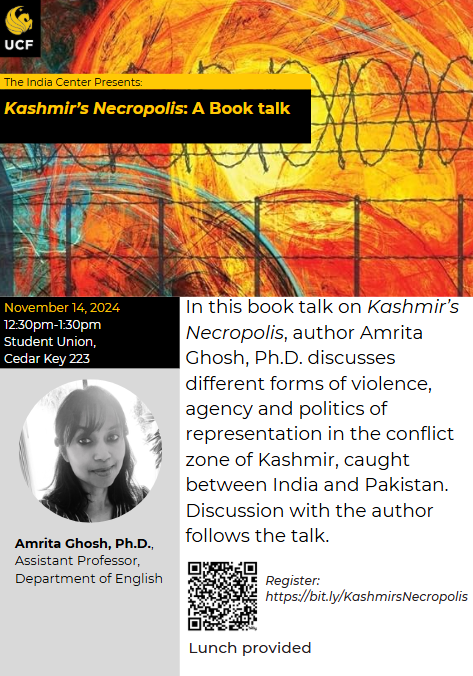By Arjun Sherugar
In November, The India Center at UCF welcomed Amrita Ghosh, Ph.D., Assistant Professor in the Department of English, for a discussion on Ghosh’s newest book “Kashmir’s Necropolis.” The event offered students, faculty, and community members an opportunity to engage with the complex narratives emerging from one of South Asia’s most contested regions.
Ghosh’s presentation drew from her interdisciplinary research, which examines literature, film, photography, and visual art to explore how Kashmir’s conflict is represented through cultural production. Her work highlights the evolving nature of violence in the region and the ways in which it intersects with questions of identity, agency, and memory.
“More than one blackout per week in Kashmir in the first 30 weeks, with the government suspending civic rights and telecommunications whenever they wanted. This affected about 8 million people, alienating them from the rest of the world,” Ghosh noted, emphasizing the human impact of state-imposed restrictions.
She also discussed how the region’s political climate has shifted over time, pointing to the decline in tourism and its economic consequences for local communities. Her analysis introduced concepts such as epicolonialism, horrorism, and necropolitics to frame the layered experiences of those living in Kashmir.
The event was part of The India Center’s ongoing mission to promote scholarship and dialogue on contemporary India. Yogesh Joshi, Ph.D., Indian Community Endowed Assistant Professor and Director of The India Center, underscored the importance of understanding the broader implications of the Kashmir conflict.
“This is a region that directly affects the lives of people in both India and Pakistan—two of the world’s most populous nations,” Joshi said. “It’s essential for students to grasp the human dimensions of this issue and how it resonates globally.”
The discussion offered a nuanced lens into the lived realities of Kashmir and reflected The India Center’s commitment to fostering informed conversations on critical issues shaping the region.
